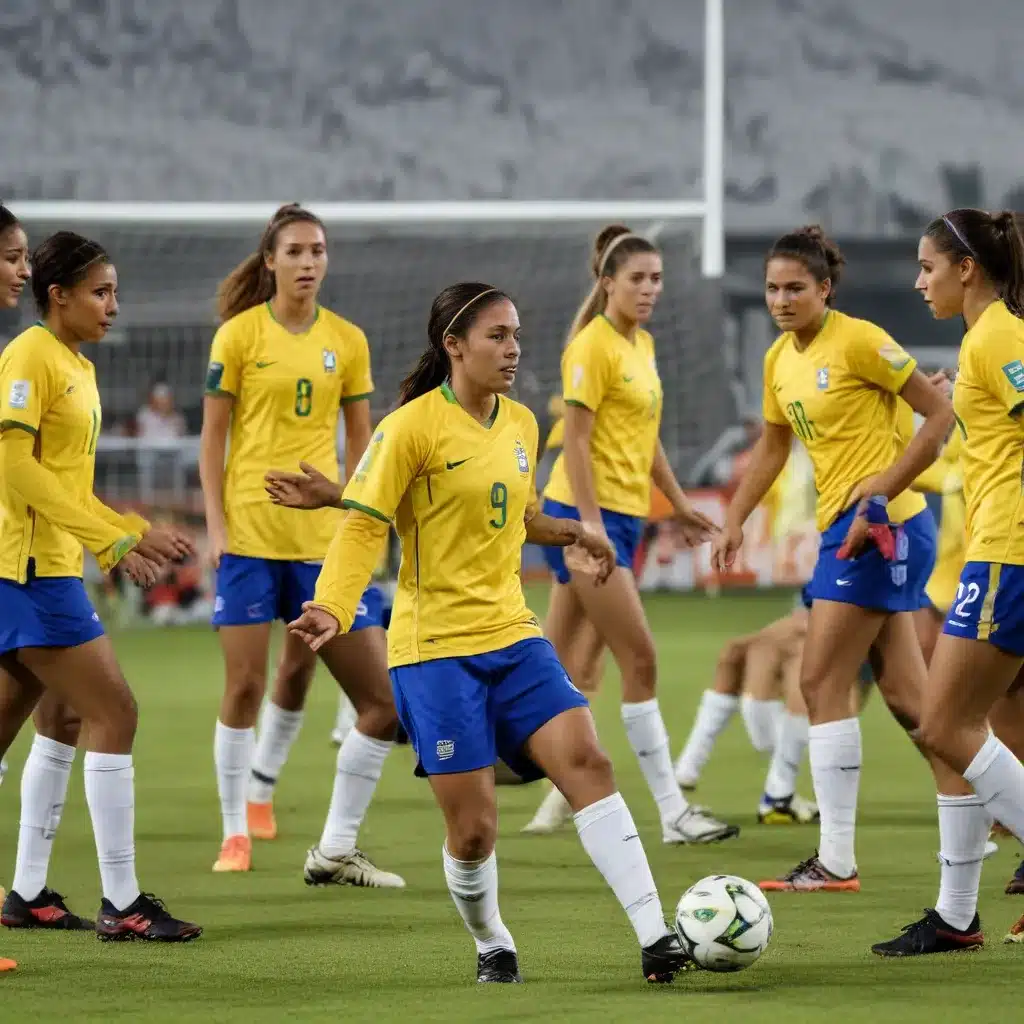
Societal Norms and Challenges
In the football-crazed nation of Brazil, the sport has long been considered a male-dominated realm. For decades, the beautiful game was seen as an exclusive pursuit for men, with deeply entrenched societal norms relegating women to the sidelines. However, a new generation of Brazilian footballers is shattering these outdated perceptions, refusing to be confined by gender stereotypes and paving the way for a more inclusive future.
The journey for women in Brazilian football has been arduous, marked by a patriarchal society that often dismissed their aspirations and capabilities. Historically, the sport was viewed as unbecoming of “proper” women, with cultural biases and discrimination posing significant hurdles. Families discouraged their daughters from pursuing football, worried that it would compromise their femininity or make them “too masculine.”
But the resilience and determination of pioneering female players have been nothing short of inspirational. Trailblazers like Marta, Formiga, and Cristiane have not only excelled on the pitch but have also used their platforms to challenge the status quo and champion greater gender equality in the game.
Pioneering Brazilian Footballers
Marta, often referred to as the “Pelé in skirts,” is undoubtedly the most recognizable and celebrated women’s footballer to emerge from Brazil. With a record six FIFA World Player of the Year awards, she has shattered glass ceilings and captivated audiences worldwide with her mesmerizing skills and goal-scoring prowess. Marta’s unwavering commitment to the sport and her refusal to be deterred by societal expectations have made her a role model for aspiring young girls across the country.
Formiga, another Brazilian icon, has etched her name in history as the only player, male or female, to have participated in seven FIFA Women’s World Cups. Her longevity and unwavering dedication to the national team have been a testament to her resilience and the evolving landscape of women’s football in Brazil.
Cristiane, Marta’s longtime teammate, has also been a trailblazer in her own right. With over 100 international goals for Brazil, she has consistently proven her mettle on the global stage, inspiring a new generation of footballers to dream big and defy the odds.
Football Culture in Brazil
The Brazilian national team’s success on the international stage has been a source of immense pride for the country, and the women’s team has played a pivotal role in this legacy. From their triumphant performances at the Olympic Games to their hard-fought battles at the FIFA Women’s World Cup, the Seleção Feminina has captivated the nation’s football-loving fans and shattered preconceptions about the capabilities of female athletes.
Grassroots initiatives have also played a crucial role in fostering a more inclusive football culture in Brazil. Organizations like the Brazilian Football Confederation (CBF) have invested in youth development programs, ensuring that girls across the country have access to quality coaching and opportunities to showcase their talents. These efforts have not only unearthed a wealth of promising young footballers but have also challenged the notion that the sport is solely the domain of men.
Changing Perceptions
The increased media representation of women’s football in Brazil has been a significant driver in shifting societal perceptions. Once relegated to the periphery of sports coverage, the exploits of the national team and domestic league stars are now garnering more attention, with dedicated television broadcasts, newspaper articles, and social media highlights.
This newfound visibility has been instrumental in challenging the traditional narratives surrounding female footballers. Audiences are now witnessing the skill, passion, and determination of these athletes, who are proving that they are just as deserving of recognition and support as their male counterparts.
Institutional support from the government and football governing bodies has also played a crucial role in driving change. The Brazilian Football Confederation (CBF) has implemented policies and programs aimed at promoting gender equality in the sport, while the government has introduced legislation to ensure that women’s football receives the same level of funding and resources as the men’s game.
Future Prospects
As the professionalisation of women’s football in Brazil continues to gather momentum, the future prospects for female footballers in the country are increasingly bright. The growth of the domestic league, the Campeonato Brasileiro de Futebol Feminino, has provided more opportunities for players to showcase their talents and earn a livelihood from the sport.
Moreover, the increased visibility and recognition of women’s football have paved the way for greater investment and sponsorship opportunities. Brands and corporations are now recognizing the immense potential of the sport, leading to improved infrastructure, better training facilities, and more lucrative contracts for female players.
The impact of these trailblazing women extends far beyond the pitch. By shattering stereotypes and redefining the boundaries of what is possible, they are inspiring a new generation of girls to pick up a football and chase their dreams. The future of women’s football in Brazil is not just about on-field success, but about transforming societal attitudes and empowering young girls to believe that they too can excel in the beautiful game.
As the world watches in awe, the Brazilian women’s football team continues to write a remarkable chapter in the nation’s rich sporting history, one that celebrates their resilience, their skill, and their unwavering determination to break free from the shackles of societal norms. The future of Brazilian women’s football is bright, and these trailblazers are paving the way for a more inclusive, equitable, and inspiring future for the beautiful game.

